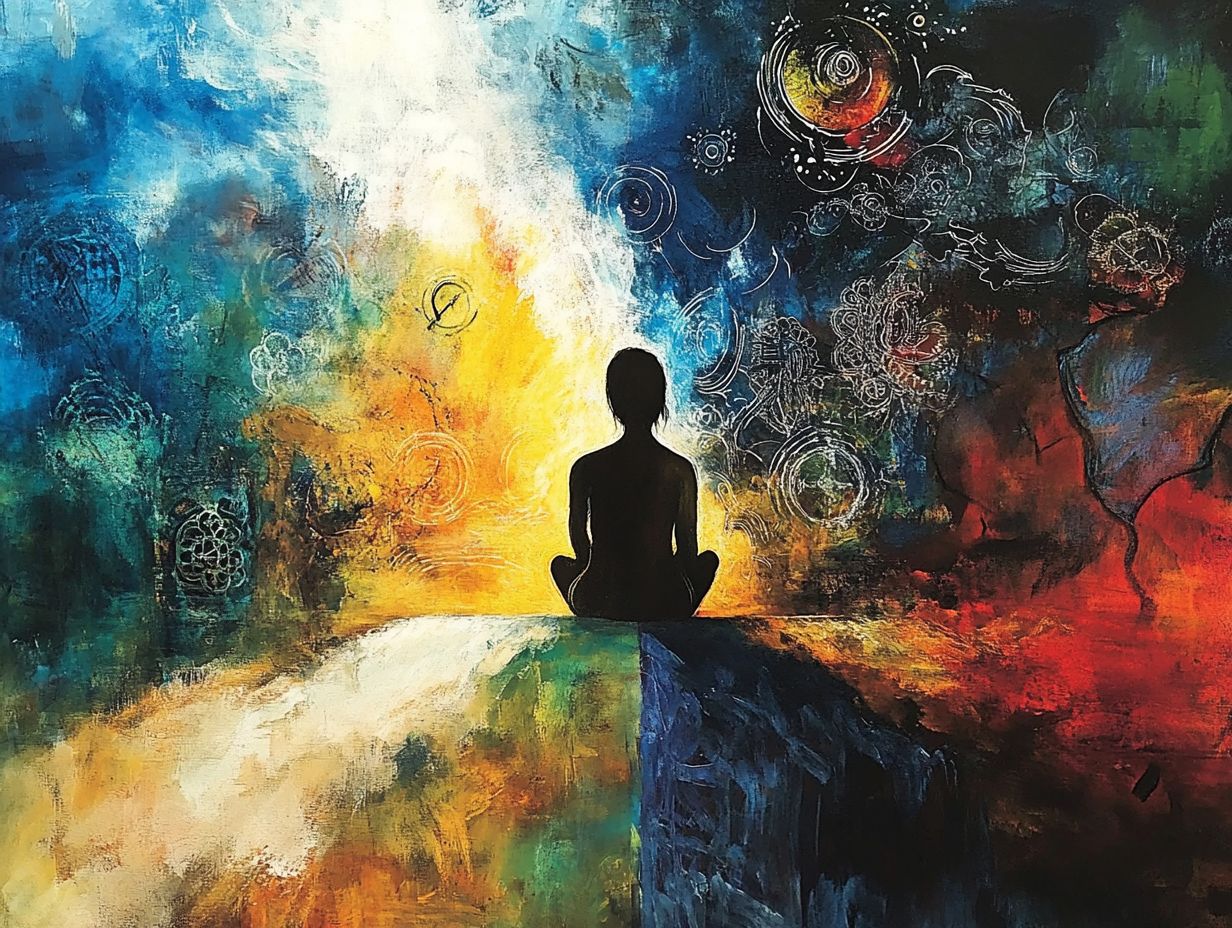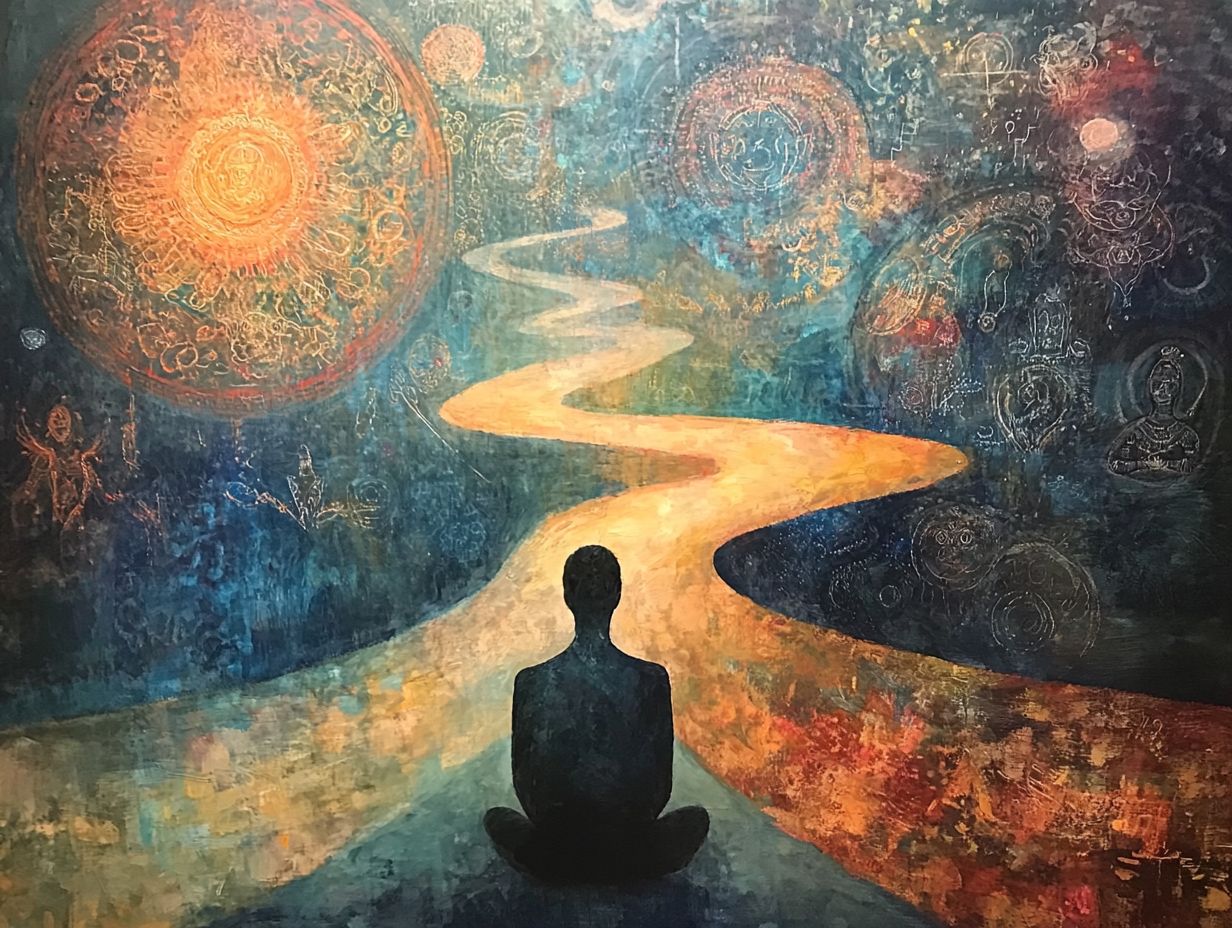Why I Left Hinduism?
Hinduism, recognized as one of the world’s oldest religions, presents a complex and diverse belief system that profoundly influences the lives of millions. For some individuals, their spiritual journey within this faith leads them to a pivotal crossroads where they contemplate conversion or, in some cases, departure from their inherited beliefs.
This exploration seeks to illuminate the various motivations underlying these significant life choices, examining why some individuals embrace Hinduism while others find the need to distance themselves from it.
It addresses the misconceptions that often accompany such choices, the challenges encountered by those who choose to leave, including religious trauma, and the potential benefits that may arise from embarking on a new spiritual path.
Whether one is intrigued by the dynamics of faith or reflecting on their own spiritual journey, this discussion provides valuable insights into the personal experiences and existential questions that shape individual beliefs.
What is Hinduism?

Hinduism stands as a complex and ancient religion, intricately woven into the rich tapestry of spiritual beliefs, practices, and cultural traditions that primarily emerge from the Indian subcontinent. Recognized as one of the world’s oldest belief systems, it has undergone a remarkable evolution over thousands of years, integrating diverse philosophies, ritual practices, and sacred texts, such as the Vedas, Upanishads, and the Bhagavad Gita.
These religious texts serve as guiding lights for countless adherents on their paths toward enlightenment and self-discovery. With its multitude of deities and fundamental concepts like karma, reincarnation, and moksha, Hinduism offers profound avenues for philosophical exploration and personal experience, significantly shaping the identities of millions around the globe.
Why do people convert to Hinduism?
The conversion to Hinduism frequently arises from a deep quest for spiritual fulfillment and authenticity, as individuals seek a belief system that aligns more closely with their personal experiences and philosophical inquiries, including meditation practices and the search for inner peace.
Many converts find themselves attracted to the inclusive and pluralistic essence of Hinduism, which welcomes a multitude of paths to spirituality and recognizes the interconnectedness of all beliefs. This openness facilitates a rich exploration of faith, standing in contrast to more dogmatic religions and promoting freedom of belief.
Such a journey often entails substantial shifts in cultural identity, active engagement with community practices, and participation in interfaith dialogues and meditation practices, all of which serve to further enrich their spiritual odysseys.
What are the reasons for leaving Hinduism?
Departing from Hinduism can be a profoundly personal and often tumultuous journey, shaped by a multitude of factors, including ethical dilemmas, familial expectations, and a pursuit of new beliefs, including atheism or agnosticism, that align more harmoniously with one’s evolving worldview.
Many individuals who choose to leave the faith express their dissent regarding core tenets, recount negative experiences within the community, or reveal a waning connection to the rituals and traditions that once characterized their spirituality, often leading to an identity crisis.
This transition frequently involves navigating intricate emotional conflicts, as individuals confront doubts and the ramifications of altering their cultural identity amid their spiritual evolution.
1. Disagreement with core beliefs
Disagreement with core beliefs frequently serves as a significant impetus for individuals to depart from Hinduism. They may find themselves questioning fundamental tenets such as karma, reincarnation, or the nature of deities endorsed by the faith. This internal discord can arise from personal experiences or philosophical inquiries that confront the moral values and teachings instilled in them during their upbringing, ultimately leading to ethical dilemmas and a profound reevaluation of their spirituality and belief reassessment.
For instance, one might grapple with the concept of karma when faced with suffering in their life or the broader world, pondering the perplexing question of why good deeds do not always yield positive outcomes. Such a conflict may inspire a deeper philosophical inquiry into the fairness of the universe, prompting a critical examination of the notion of divine justice and existential questions embedded within the religion.
Similarly, experiences of witnessing injustice or inequality could invoke ethical questions about the caste system, urging individuals to reflect on the alignment of their personal values with those upheld by their religious community. This process of introspection and the challenge of established beliefs often catalyze a spiritual evolution, encouraging individuals to seek alternative paths that resonate more harmoniously with their transformed worldview, promoting self-awareness and critical thinking.
2. Negative experiences within the religion
Negative experiences within the Hindu community can profoundly impact an individual’s decision to depart from the faith, often surfacing as feelings of alienation, religious trauma, or conflicts arising from family pressure and societal expectations. Such experiences frequently stem from judgment or discrimination based on personal choices, resulting in heightened emotional turmoil that disrupts one’s spiritual journey and sense of belonging, often leading to an identity crisis.
The emotional upheaval resulting from these negative encounters can foster a deep sense of disconnection from the community that once provided support and guidance. Individuals find themselves grappling with conflicting emotions, torn between a desire for acceptance and the imperative to honor their true selves. This internal struggle often ignites a profound yearning for freedom, compelling many to reevaluate their beliefs and seek solace beyond the confines of their upbringing, promoting psychological impact and emotional struggle.
As a result, the process of leaving the faith may evolve into not merely an escape from pain but also a complex yet liberating journey toward self-discovery and healing, as individuals navigate the intricate landscape of their identity and spirituality, promoting resilience and personal empowerment.
3. Lack of connection with the religion
A pronounced lack of connection with the tenets, practices, and community of Hinduism often compels individuals to seek alternative spiritual paths, as they may sense that their personal beliefs and spiritual journeys are not adequately represented within the confines of the religion. This disconnect frequently catalyzes a quest for self-discovery and a more authentic expression of one s spirituality, encouraging individuals to explore beliefs that resonate more profoundly with their lived experiences, promoting spiritual exploration and freedom from dogma.
As they navigate the intricacies of their spiritual journeys, many individuals discover that the absence of a supportive community intensifies feelings of isolation. Their search for meaningful connections can lead them to alternative practices that provide a sense of belonging and understanding, promoting community support and inner peace.
In this exploration, individuals often immerse themselves in new philosophies or spiritual movements that offer both guidance and camaraderie elements that are essential to their self-exploration. This transformative shift not only aids in aligning their personal beliefs with their experiences but also nurtures a deeper sense of fulfillment as they connect with like-minded souls who share similar journeys, promoting mental health and spiritual growth.
4. Influence of other religions or beliefs

The influence of various religions and belief systems can significantly motivate individuals to depart from Hinduism. Exposure to contrasting spiritual perspectives often ignites critical thinking and prompts a reevaluation of personal beliefs. This transformative process frequently occurs through interfaith dialogue, personal relationships, or the exploration of alternative philosophies that resonate more deeply with one’s spiritual journey, resulting in a profound evolution of individual convictions and promoting faith evolution.
As individuals delve into the principles of different faiths, they may uncover alternative pathways that align more closely with their values and life experiences. This spiritual exploration enables them to reflect on their upbringing and question established doctrines, sometimes leading to a heartfelt yearning for belonging or an authentic quest for truth and truth-seeking.
Interfaith interactions serve as a unique platform for understanding diverse perspectives, fostering empathy and mutual respect. Such experiences can ultimately inspire individuals to redefine their spiritual identity. Through this journey, many come to realize that the search for meaning is a deeply personal endeavor, intricately shaped by the interplay of various influences and experiences, promoting acceptance of diversity and secular values.
What are the common misconceptions about leaving Hinduism?
Numerous prevalent misconceptions surrounding the departure from Hinduism often cloud the discourse on apostasy, leading many to view this decision as a betrayal of cultural identity or an emotionally charged reaction against familial and societal expectations, promoting identity politics and identity exploration.
Such assumptions tend to overlook the intricacies of individual journeys and the philosophical questions that inform one’s choice to leave the faith. They frequently fail to acknowledge the role of religious pluralism and the quest for deeper authenticity in one’s spiritual life, thus simplifying a profoundly personal and complex experience, promoting the importance of critical inquiry and personal reflection.
1. It is seen as a betrayal
The notion that leaving Hinduism constitutes a betrayal of one s cultural identity resonates deeply among both practitioners and the broader community, often resulting in feelings of alienation for those who make the choice to depart. This sentiment is frequently intensified by familial pressures and expectations, creating a multifaceted emotional landscape for individuals navigating their spiritual and personal journeys.
As many grapple with this internal struggle, the weight of community judgment becomes a formidable presence, further complicating their sense of belonging. The anxiety of potential ostracism from family gatherings or social events can be daunting, as individuals find themselves caught between their evolving beliefs and the traditions that have shaped their upbringing, often questioning their own values and faith.
In such moments, the emotional ramifications extend beyond personal choices, echoing through familial bonds and community connections, ultimately reshaping one s identity and sense of self. This underscores the profound implications that such a perceived betrayal can carry, not only for the individual but also for the intricate tapestry of family and community relationships.
2. It is assumed to be a decision made out of anger or rebellion
To assume that the decision to leave Hinduism is merely a result of anger or rebellion is to oversimplify the intricate nature of faith transitions. This perspective often overlooks the deeper emotional conflicts and existential questions that underpin such choices. Many individuals embark on this journey not out of defiance, but from a sincere quest for self-identity and spiritual fulfillment that resonates with their evolving beliefs.
This transformative process frequently entails profound introspection and a confrontation with long-held values and traditions. The challenge of redefining one s inner self, while navigating feelings of loss or estrangement, adds significant complexity to the narrative.
Navigating through faith can evoke intense emotional turmoil, prompting individuals to seek alternative spiritual paths that align with their personal truths. Rather than viewing these departures as mere acts of rebellion, it is crucial to acknowledge them as essential steps in a pursuit of authenticity, where the ultimate goal is to achieve inner peace and alignment with one s individual beliefs and life philosophy.
3. It is believed to be a result of brainwashing by other religions
The notion that individuals abandon Hinduism due to brainwashing by other religions represents a damaging misconception that stigmatizes those who are exploring alternative beliefs. This perspective neglects to acknowledge the agency of individuals engaged in critical thinking and personal inquiry. These individuals often arrive at informed decisions that reflect their authentic spiritual journeys rather than succumbing to coercive influences.
Such misunderstandings not only diminish the significance of the personal struggles and explorations that many individuals endure but also perpetuate a narrow narrative that fails to recognize the rich diversity of faith experiences. When individuals opt to reexamine their beliefs, this choice should be regarded as a courageous act of self-discovery rather than a sign of manipulation.
By nurturing an environment that promotes open dialogue and respectful questioning, society can work towards dismantling these harmful stereotypes. Ultimately, understanding that faith transitions frequently arise from thoughtful contemplation and a genuine quest for truth can help foster empathy for those navigating their spiritual paths and personal journeys.
What are the challenges faced by those who leave Hinduism?
Individuals who choose to leave Hinduism often face a multitude of challenges that profoundly affect their emotional well-being and sense of belonging.
These challenges frequently include social stigma and discrimination from both their former community and the wider society. Such obstacles can result in a profound loss of community support, fostering feelings of isolation and complicating their journey toward self-actualization and spiritual fulfillment.
Such transitions may also involve questioning key religious texts like the Vedas and Upanishads, and dealing with the psychological impact of leaving behind ritual practices and dogmas.
1. Social stigma and discrimination

Social stigma and discrimination present formidable challenges for individuals who choose to leave Hinduism. They often encounter judgment and exclusion from their former communities, which can trigger an identity crisis that deeply affects their sense of self. This societal pressure tends to magnify feelings of isolation and can significantly impede personal growth during their spiritual journey.
Such experiences frequently lead to a profound sense of loss not only in terms of community connections but also concerning the very belief systems that once shaped their identities. These individuals may grapple with redefining themselves outside of the roles they previously inhabited, as the separation from their past induces doubts about their values and sense of purpose.
The internal conflict is often intensified by the disapproval of family and friends, creating a delicate balance between the pursuit of authenticity and the fear of social retribution. This can also bring about existential questions that add to their emotional struggle. As they navigate this tumultuous phase, the quest for belonging and acceptance can become overwhelming, ultimately influencing their ongoing journey toward self-discovery and personal fulfillment.
2. Loss of community and support
The loss of community and support that often accompanies departures from Hinduism can leave individuals feeling unmoored, intensifying emotional conflicts and complicating their quest for belonging and acceptance within new spiritual frameworks. This absence may compel individuals to seek out new communities that resonate with their evolving beliefs, a journey that can prove both challenging and deeply vulnerable.
As they navigate this delicate landscape, many individuals grapple with feelings of isolation and uncertainty, questioning their own identities and the fundamental values that once provided structure in their lives. The struggle to discover a community that aligns closely with their beliefs can heighten their sense of alienation.
This journey necessitates a careful balance between personal authenticity and an innate desire for connection, making it essential for these individuals to cultivate resilience while seeking environments that not only celebrate diversity of thought but also nurture genuine understanding and support. The role of community support becomes even more crucial as these individuals may also deal with the loss of traditional religious practices and the emotional support once provided by religious authorities.
3. Difficulty in finding a new spiritual path
Finding a new spiritual path after leaving Hinduism can often be a journey marked by uncertainty and confusion, as individuals grapple with reconciling their past experiences with their aspirations for personal growth and self-discovery. This search for meaning frequently involves navigating unfamiliar beliefs and practices, an endeavor that can be both enlightening and disorienting.
Throughout this journey, individuals may face emotional conflicts that challenge their fundamental beliefs and values, resulting in a paradox where they yearn for new insights while simultaneously wrestling with the residues of their former faith. The quest for authenticity compels them to confront deeply rooted fears and doubts, prompting them to question what truly resonates with their evolving sense of self.
This intricate process not only fosters reflection on previous narratives but also opens the door to transformative experiences, facilitating a deeper understanding of themselves within the expansive tapestry of spiritual traditions. This transition may involve embracing new spiritual practices like meditation or studying different religious texts. It is through this delicate balancing act that they may ultimately forge a new identity, enriched by the wisdom gleaned from both their past and present explorations.
What are the benefits of leaving Hinduism?
Departing from Hinduism can provide individuals with a profound sense of liberation and freedom, enabling them to delve into their personal beliefs and engage in spiritual exploration unrestrained by former constraints like dogma and ritual practices.
This newfound autonomy often fosters enhanced mental health and emotional well-being, as individuals chart their own spiritual journeys and seek authentic paths that resonate with their evolving identities.
1. Feeling of liberation and freedom
The liberation and sense of freedom that often accompany leaving Hinduism enable individuals to pursue their personal beliefs and achieve self-actualization, unencumbered by dogma or tradition. This newfound autonomy can be transformative, creating the opportunity for individuals to redefine their spiritual identities and embrace diverse practices that resonate more authentically with their life philosophies.
As they distance themselves from conventional teachings, many individuals experience a profound sense of relief, fostering an environment rich in reflection and re-evaluation of core values. This liberation from inherited beliefs opens the door to exploring new spiritual landscapes, encouraging a connection with philosophies and ideologies that genuinely resonate with their true selves.
This journey toward self-actualization frequently results in heightened self-awareness and a deeper understanding of one’s purpose in life. Consequently, individuals discover enablement in crafting their spiritual paths, free from external expectations, allowing them to pursue holistic personal growth that aligns seamlessly with their innermost aspirations and desires. The freedom from dogma allows for a more nuanced exploration of spirituality versus religion.
2. Ability to explore and find one’s own beliefs
The ability to explore and discover one s own beliefs after leaving Hinduism enables individuals to embark on a deeply personal and rewarding spiritual journey, with authenticity serving as their guiding principle. This exploration may lead them to encounter various philosophies and practices, enriching their understanding of spirituality, faith, and cultural identity while facilitating significant personal growth.
As they navigate this transformative phase, they may find themselves drawn to diverse ideologies, from Buddhism to secular humanism and even agnosticism or atheism, each offering unique insights and pathways to introspection. The freedom to question and adapt beliefs in a manner that resonates personally fosters a profound connection to their own essence.
This journey invites them to reclaim their narrative and encourages the embrace of practices such as meditation, mindfulness, or new community engagements that align with their evolving values and traditions, ultimately paving the way for a more authentic existence.
3. Improved mental and emotional well-being

For many individuals who choose to leave Hinduism, improved mental and emotional well-being emerges as a significant benefit. The newfound freedom to navigate their own spiritual journeys often alleviates the pressures and conflicts associated with adhering to a prescribed belief system. This liberation fosters self-enablement and personal empowerment, enabling them to cultivate healthier perspectives and practices that promote lasting emotional resilience.
As they distance themselves from the confines of traditional doctrines, individuals frequently uncover a renewed sense of purpose and identity that had previously been overshadowed. Embracing personal growth opens the door to exploring alternative spiritual paths that resonate more closely with their values, traditions, and experiences. This forward journey can enhance emotional well-being, allowing them to shed feelings of guilt, fear, or obligation that were tied to their past beliefs.
Such transformative experiences enable individuals to take control of their lives and construct a more fulfilling existence, ultimately nurturing a deeper sense of inner peace, self-acceptance, and self-identity.
Frequently Asked Questions on Spiritual Journeys and Belief Systems
Why did you leave Hinduism and its traditions?
I left Hinduism because I no longer resonated with its beliefs and practices. I found a different spiritual path that aligned more with my personal beliefs, values, and life philosophy.
Was there a specific event or moment that led to your decision to leave Hinduism and question its dogmas?
There wasn’t one specific event, but rather a gradual realization that Hinduism was not the right fit for me. I began to question and critically examine its teachings, scriptures, and dogmas, and ultimately made the decision to leave.
Did your family, community, or cultural heritage play a role in your decision to leave Hinduism?
My family and community are still practicing Hindus, but they have been supportive of my decision to leave. They respect my choices and understand that each person’s spiritual journey is unique. However, navigating family dynamics and peer pressure was challenging.
What did you find lacking in Hinduism, such as its ritual practices or dogma, that led you to leave?
I found that Hinduism did not fully align with my personal beliefs and values, particularly in regards to gender equality, social justice, and questions of morality. I also felt limited by its strict hierarchical caste system and traditional ritual practices.
Did you find a new spiritual path or religious practices after leaving Hinduism?
Yes, I found a new spiritual path that better resonates with my beliefs and values. I have found greater peace and fulfillment in this new path, which includes meditation practices and philosophical inquiry.
Do you regret leaving Hinduism and its traditional belief system?
No, I do not regret my decision to leave Hinduism. It was a difficult and personal decision, but ultimately it was the best choice for my spiritual growth, well-being, and freedom of belief.
